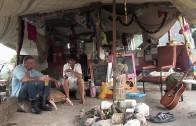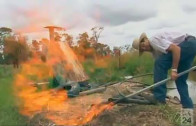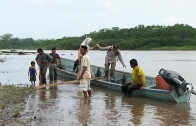Grasp the Nettle
Two years before the Occupy movement sprang forth in New York, a small group of land-rights activists occupied a piece of disused land in west London to create an “alternative model of moneyless, sustainable living” which they labelled, the Eco-Village. Echoing the dynamics of hippy communes in the United States decades earlier, Grasp the Nettle follows the often bewildering and even amusing actions of this group through many moments of idyllic beauty, as they use local trees and recycled rubbish to build small homes, go dumpster diving, build a manually operated shower and compost toilet, create a local seed bank, and help distribute dumpstered sandwiches to the city’s homeless. But the Eco-Village quickly becomes something other than just an idealistic experiment in political protest. It begins to attract vulnerable people who already live on the margins of society and need help: the homeless, the unemployed, alcoholics, the mentally ill. Some of them are invited to stay, but others cause a ruckus and harm the group. Tensions spark as the community grapples to deal with the increasing chaos while trying to stave off the fast-approaching prospect of eviction, through the ideologies of withdrawal, dropping out, freemanism and spirtuality. Grasp the Nettle is hence a valuable reflection of the efficacy of this type of Wandervogel-style activism, where lack of goals and support infrastructure, a diverse array of internal conflicts and horizontal hostility can be the ultimate undoing of idealistic and much-needed political resistance movements.




